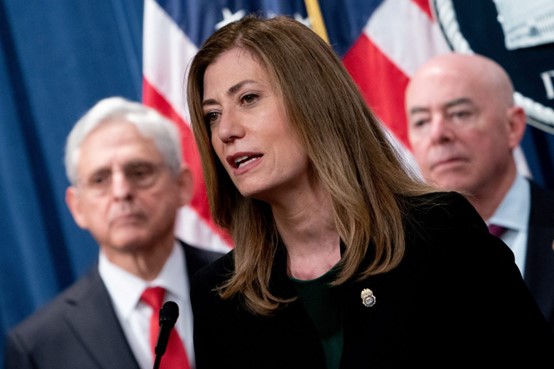
這個側面印有"生日快樂"字樣的白色禮品袋里并沒有禮物。據當局指控,里面裝著錫那羅亞販毒集團需要洗白的22.6萬美元現金。
美國司法部(U.S. Department of Justice)周二發布了一份涉及多項罪名的起訴書,指控墨西哥錫那羅亞販毒集團的十幾名洛杉磯成員和中國貨幣經紀人多年來合謀洗白毒資。主要被告埃德加·喬爾·馬丁內斯-雷耶斯(Edgar Joel Martinez-Reyes),現年45歲,東洛杉磯居民。迄今為止,這項調查已繳獲500萬美元現金、300多磅可卡因(合136千克)、92磅甲基苯丙胺(合41.7千克)、3000粒搖頭丸和44磅神奇蘑菇(19.9千克)。根據起訴書,被告名單包括"P博士"唐培基(音譯,Peiji “Dr. P” Tong)、"Tommy"張賽(音譯,Sai “Tommy” Zhang)、"Ocean"何成武(音譯,Chengwu “Ocean” He)、勞爾·"蝙蝠俠"·孔特雷拉斯(Raul “Batman” Contreras)、"Edward"何家軒(音譯,Jiaxuan “Edward” He)、迭戈·阿科斯塔·奧瓦列(Diego Acosta Ovalle)等人。
首批20名被告將在未來幾周內接受提審,如果所有指控罪名成立,每人將面臨至少10年監禁,或最高終身監禁的處罰。
美國緝毒署署長安妮·米爾格拉姆在一份聲明中說:“貪婪無情和對金錢的追逐是墨西哥販毒集團的驅動力,他們是美國歷史上最嚴重的毒品危機的罪魁禍首。緝毒署的調查揭露了錫那羅亞販毒集團與在洛杉磯和中國運作的中國犯罪集團為洗白毒資建立的合作關系。”
美國司法部表示,這個總部設在墨西哥錫那羅亞州的販毒集團是過去8年芬太尼在美國大量流入(帶來了大量現金)的幕后推手。當局說,為了把錢轉移到墨西哥,販毒集團成員求助于中國在美國的貨幣交易所。據稱,大約四年前,馬丁內斯-雷耶斯和"P博士"唐培基前往墨西哥簽署合同,為販毒集團的毒品利潤洗錢,以換取傭金。
達成協議后,毒販將現金交給貨幣經紀人進行洗錢。當局表示,為了掩飾現金,被告使用禮品袋、可重復使用的購物袋、背包、水果味麥片盒和其他物品來藏匿現金。
檢察官表示,這些人員購買了加密貨幣,或以小規模、有組織的方式將錢存入銀行賬戶。起訴書指出,加密貨幣很容易被轉移到錫那羅亞販毒集團持有的賬戶中。其他洗錢方法包括購買貴金屬和寶石,并將其帶到墨西哥出售。
起訴書概述了一個涉及中國貨幣交易所的復雜計劃。美國司法部說,與這些販毒集團合作的貨幣交易所還為那些在中國投資并希望將資金轉移到美國但被中國政府禁止的中國富人提供幫助。中國的相關規定禁止人們每年向境外轉移超過5萬美元的資金。
當局說,為了規避這些限制,中國居民會尋求出售美元的經紀人的幫助。經紀人向中國居民提供中國的銀行賬戶信息,并指示他們將人民幣存入賬戶。一旦賬戶持有人確認存款,就會將等額美元交給美國經紀人。這些經紀人從販毒集團那里收取現金,并收取總額的0.5%至2%的傭金,以掩蓋毒資。(當局表示,傳統洗錢者收取的費用遠高于中國洗錢者,從5%到10%甚至更高)。
美國司法部表示:“毒販越來越多地與中國地下貨幣交易所合作,以利用中國公民對美元的巨大需求。”
起訴書稱,這些經紀人要么直接將美元交付給客戶,要么購買房產、奢侈品和汽車(運往中國)。當局表示,在中國轉移的資金被用于為墨西哥的企業購買消費品或用于制造更多毒品的化學品等物品。
美國國稅局刑事調查局局長蓋伊·菲科(Guy Ficco)說:"這起案件是中國洗錢者與毒販合作,試圖將毒品活動產生的利潤合法化的典型案例。”(財富中文網)
譯者:中慧言-王芳
這個側面印有"生日快樂"字樣的白色禮品袋里并沒有禮物。據當局指控,里面裝著錫那羅亞販毒集團需要洗白的22.6萬美元現金。
美國司法部(U.S. Department of Justice)周二發布了一份涉及多項罪名的起訴書,指控墨西哥錫那羅亞販毒集團的十幾名洛杉磯成員和中國貨幣經紀人多年來合謀洗白毒資。主要被告埃德加·喬爾·馬丁內斯-雷耶斯(Edgar Joel Martinez-Reyes),現年45歲,東洛杉磯居民。迄今為止,這項調查已繳獲500萬美元現金、300多磅可卡因(合136千克)、92磅甲基苯丙胺(合41.7千克)、3000粒搖頭丸和44磅神奇蘑菇(19.9千克)。根據起訴書,被告名單包括"P博士"唐培基(音譯,Peiji “Dr. P” Tong)、"Tommy"張賽(音譯,Sai “Tommy” Zhang)、"Ocean"何成武(音譯,Chengwu “Ocean” He)、勞爾·"蝙蝠俠"·孔特雷拉斯(Raul “Batman” Contreras)、"Edward"何家軒(音譯,Jiaxuan “Edward” He)、迭戈·阿科斯塔·奧瓦列(Diego Acosta Ovalle)等人。
首批20名被告將在未來幾周內接受提審,如果所有指控罪名成立,每人將面臨至少10年監禁,或最高終身監禁的處罰。
美國緝毒署署長安妮·米爾格拉姆在一份聲明中說:“貪婪無情和對金錢的追逐是墨西哥販毒集團的驅動力,他們是美國歷史上最嚴重的毒品危機的罪魁禍首。緝毒署的調查揭露了錫那羅亞販毒集團與在洛杉磯和中國運作的中國犯罪集團為洗白毒資建立的合作關系。”
美國司法部表示,這個總部設在墨西哥錫那羅亞州的販毒集團是過去8年芬太尼在美國大量流入(帶來了大量現金)的幕后推手。當局說,為了把錢轉移到墨西哥,販毒集團成員求助于中國在美國的貨幣交易所。據稱,大約四年前,馬丁內斯-雷耶斯和"P博士"唐培基前往墨西哥簽署合同,為販毒集團的毒品利潤洗錢,以換取傭金。
達成協議后,毒販將現金交給貨幣經紀人進行洗錢。當局表示,為了掩飾現金,被告使用禮品袋、可重復使用的購物袋、背包、水果味麥片盒和其他物品來藏匿現金。
檢察官表示,這些人員購買了加密貨幣,或以小規模、有組織的方式將錢存入銀行賬戶。起訴書指出,加密貨幣很容易被轉移到錫那羅亞販毒集團持有的賬戶中。其他洗錢方法包括購買貴金屬和寶石,并將其帶到墨西哥出售。
起訴書概述了一個涉及中國貨幣交易所的復雜計劃。美國司法部說,與這些販毒集團合作的貨幣交易所還為那些在中國投資并希望將資金轉移到美國但被中國政府禁止的中國富人提供幫助。中國的相關規定禁止人們每年向境外轉移超過5萬美元的資金。
當局說,為了規避這些限制,中國居民會尋求出售美元的經紀人的幫助。經紀人向中國居民提供中國的銀行賬戶信息,并指示他們將人民幣存入賬戶。一旦賬戶持有人確認存款,就會將等額美元交給美國經紀人。這些經紀人從販毒集團那里收取現金,并收取總額的0.5%至2%的傭金,以掩蓋毒資。(當局表示,傳統洗錢者收取的費用遠高于中國洗錢者,從5%到10%甚至更高)。
美國司法部表示:“毒販越來越多地與中國地下貨幣交易所合作,以利用中國公民對美元的巨大需求。”
起訴書稱,這些經紀人要么直接將美元交付給客戶,要么購買房產、奢侈品和汽車(運往中國)。當局表示,在中國轉移的資金被用于為墨西哥的企業購買消費品或用于制造更多毒品的化學品等物品。
美國國稅局刑事調查局局長蓋伊·菲科(Guy Ficco)說:"這起案件是中國洗錢者與毒販合作,試圖將毒品活動產生的利潤合法化的典型案例。”(財富中文網)
譯者:中慧言-王芳
U.S. Drug Enforcement Administration (DEA) Administrator Anne Milgram in 2023.
PHOTO BY STEFANI REYNOLDS / AFP
The white gift bag with a cheery “Happy Birthday” printed on the side didn’t have a present in it. It had $226,000 in cash that the Sinaloa drug cartel needed laundered, authorities allege.
The U.S. Department of Justice on Tuesday announced a multi-count indictment that charged more than a dozen Los Angeles members of the Mexican Sinaloa drug cartel and Chinese currency brokers with conspiring to launder drug money for years. The lead defendant, Edgar Joel Martinez-Reyes, 45, is a resident of East Los Angeles. The investigation so far has yielded $5 million in cash, more than 300 pounds of cocaine, 92 pounds of methamphetamine, 3,000 pills of Ecstasy, and 44 pounds of magic mushrooms. According to the indictment, the list of defendants includes Peiji “Dr. P” Tong, Sai “Tommy” Zhang, Chengwu “Ocean” He, Raul “Batman” Contreras, Jiaxuan “Edward” He, Diego Acosta Ovalle, and others.
The first 20 defendants will be arraigned in the next few weeks and if convicted on all charges, each faces a minimum of 10 years in prison or a maximum penalty of life in prison.
“Relentless greed, the pursuit of money, is what drives the Mexican drug cartels that are responsible for the worst drug crisis in American history,” said DEA Administrator Anne Milgram in a statement. “This DEA investigation uncovered a partnership between Sinaloa Cartel associates and a Chinese criminal syndicate operating in Los Angeles and China to launder drug money.”
The DOJ said the cartel, based in the Sinaloa state of Mexico, has been behind the surging infusion of fentanyl in the U.S. in the past eight years, which drums up hordes of cash. In order to get the money to Mexico, cartel members turned to Chinese money exchanges in the U.S., authorities said. To set it up, Martinez-Reyes and “Dr. P” Tong allegedly went to Mexico roughly four years ago to sign contracts to launder the cartel’s drug profits in exchange for a commission fee.
After the agreement was made, drug dealers laden with cash delivered it to currency brokers for laundering purposes. To disguise the cash, the defendants used gift bags, reusable shopping sacks, backpacks, a box of Fruity Pebbles, and other items to conceal the money, authorities said.
Prosecutors said the couriers bought crypto, or deposited the money into bank accounts in small, structured doses. The indictment states that the cryptocurrency could easily be transferred to accounts held by the Sinaloa Cartel. Other methods of laundering the gains included buying precious metal and gems and taking them to Mexico for sale.
The indictment outlines a complex scheme involving Chinese money exchanges. The currency exchanges that work with the cartels also assist rich Chinese nationals who invest in China and want to transfer their money to the U.S. but are barred by the Chinese government, the DOJ said. Rules in China prohibit people from moving more than $50,000 per year out of the country.
To get around the restrictions, Chinese residents tap brokers who sell U.S. dollars, authorities said. The brokers give the China-based residents bank account details in China with instructions to deposit Chinese currency into an account. Once the account holder confirms the deposit, an equivalent amount of U.S. dollars is given to the U.S. broker. The brokers take cash from the cartels and charge a percentage-based commission fee of about 0.5% to 2% of the total amount to disguise the drug money. (Traditional money launderers charge much higher rates than the Chinese launderers, authorities said, ranging from 5% to 10% or more.)
“Drug traffickers increasingly have partnered with Chinese underground money exchanges to take advantage of the large demand for U.S. dollars from Chinese nationals,” said the DOJ.
The brokers either delivered the U.S. dollars directly to customers or bought property, luxury goods, and cars that they shipped to China, the indictment states. Money transferred in China was used to buy items for businesses in Mexico like consumer goods or chemicals used to make more narcotics, authorities said.
“This case is a prime example of Chinese money launderers working hand in hand with drug traffickers to try to legitimize profits generated by drug activities,” said Guy Ficco, chief of the IRS Criminal Investigation.






